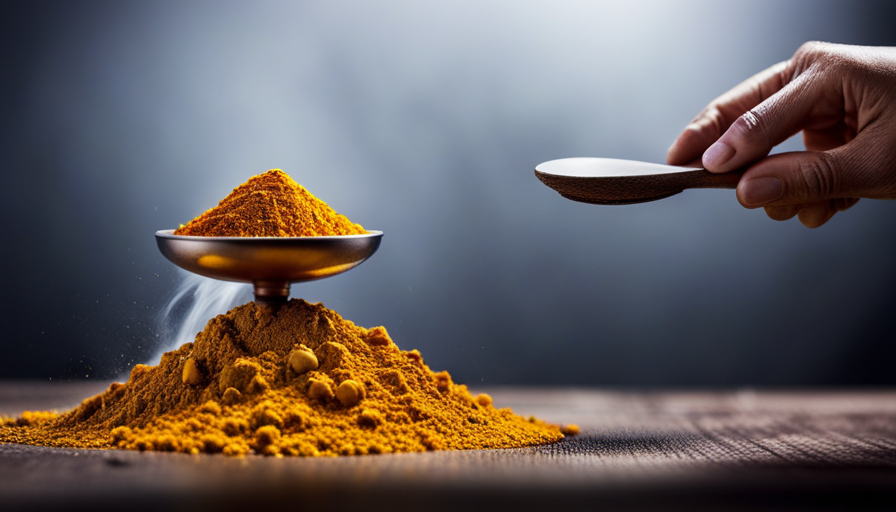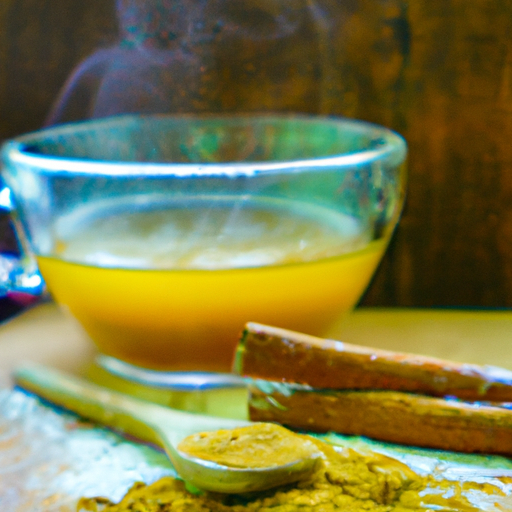As the moon rises and the stars twinkle in the night sky, there is nothing quite as comforting as a warm beverage before bed. And if you’re looking for a drink that not only soothes your senses but also brings a plethora of health benefits, look no further than ginger and turmeric tea. This golden elixir is a powerhouse of goodness, packed with antioxidants and anti-inflammatory properties that can work wonders for your well-being.
But the burning question remains: can I drink ginger and turmeric tea before bed? In this article, we will delve into the potential effects on sleep, considerations for consumption, preparation tips, and the timing and frequency of consumption. We will also explore other herbal teas that can help you achieve a peaceful night’s sleep.
So, grab your favorite mug and let’s uncover the secrets of this magical bedtime brew.
Key Takeaways
- Ginger and turmeric tea is a warm beverage that can be enjoyed before bed.
- Ginger and turmeric tea have numerous health benefits, including antioxidants and anti-inflammatory properties.
- Consuming ginger and turmeric tea before bed may promote relaxation, reduce stress levels, and potentially improve sleep quality.
- It’s important to consult with a healthcare professional before consuming ginger and turmeric tea, especially if taking certain medications or experiencing gastrointestinal discomfort.
The Health Benefits of Ginger and Turmeric Tea
You can definitely enjoy the health benefits of ginger and turmeric tea before bed! Both ginger and turmeric have been used for centuries in traditional medicine for their numerous healing properties. Ginger has anti-inflammatory and antioxidant effects, while turmeric contains a compound called curcumin, which has been shown to have anti-inflammatory, antioxidant, and even anticancer properties.
When it comes to potential side effects, ginger and turmeric are generally safe for most people when consumed in moderation. However, some people may experience mild digestive issues such as heartburn or stomach upset. It’s also important to note that excessive intake of ginger and turmeric may interfere with certain medications or be unsafe for individuals with certain medical conditions. As always, it’s best to consult with a healthcare professional before incorporating any new herbal tea into your routine.
In terms of dosage recommendations, there’s no one-size-fits-all answer. It’s recommended to start with a small amount and gradually increase the dosage as tolerated. Aim for about 1 to 2 teaspoons of grated ginger or 1/2 to 1 teaspoon of ground turmeric per cup of tea. However, it’s important to listen to your body and adjust the dosage according to your individual needs.
Now, let’s explore the potential effects of ginger and turmeric tea on sleep.
Potential Effects on Sleep
When it comes to drinking ginger and turmeric tea before bed, there are a few potential effects on sleep that are worth considering.
Firstly, both ginger and turmeric are known for their relaxation and stress-relief properties, which can help promote a calm state of mind before sleep.
Secondly, some research suggests that these ingredients may also improve sleep quality by reducing inflammation and pain, making it easier to fall asleep and stay asleep throughout the night.
Lastly, there is some anecdotal evidence that ginger and turmeric tea might lead to more vivid dreams, although more scientific studies are needed to confirm this potential effect.
Relaxation and stress relief
One interesting statistic reveals that consuming ginger and turmeric tea before bed has been shown to promote relaxation and reduce stress levels. This natural sleep aid is known for its calming properties, making it an excellent choice for individuals seeking relaxation techniques.
When sipping on a warm cup of ginger and turmeric tea, you can envision yourself in a peaceful state of mind, ready to let go of the day’s stressors. The aroma of the tea fills the room, creating a soothing atmosphere. As you take a sip, you can feel the warmth spreading throughout your body, melting away tension.
The combination of ginger and turmeric’s natural compounds helps to relax your muscles and calm your mind, preparing you for a restful night’s sleep.
With this in mind, let’s explore how ginger and turmeric tea can also improve sleep quality.
Improved sleep quality
Enhancing the quality of your sleep can be achieved by incorporating the calming effects of ginger and turmeric tea into your nighttime routine. Both ginger and turmeric have traditionally been used for their relaxing properties and may contribute to improved sleep quality.
Ginger contains compounds that’ve been shown to reduce inflammation and promote relaxation, while turmeric contains curcumin, which has been linked to decreased anxiety and improved mood. Additionally, both ingredients have antioxidant and anti-inflammatory effects that may help reduce stress levels and promote a more restful sleep.
By incorporating ginger and turmeric tea into your bedtime routine, you can potentially enhance your sleep quality and wake up feeling more refreshed.
Moving on to the next topic, the consumption of this tea before bed may also have a potential for vivid dreams.
Potential for vivid dreams
To experience more vibrant dreams, have you ever considered incorporating the calming effects of ginger and turmeric tea into your nighttime routine?
1) Ginger and turmeric have been used for centuries for their medicinal properties, including promoting better sleep.
2) Research suggests that these spices may enhance sleep quality by reducing inflammation and stress levels in the body.
3) Furthermore, ginger and turmeric contain compounds that can potentially stimulate brain activity during REM sleep, leading to more vivid dreams.
While there’s limited scientific evidence directly linking ginger and turmeric tea to vivid dreams, many individuals report experiencing more intense dream experiences after consuming these teas before bed.
Considering the potential for vivid dreams, it’s important to explore the considerations for consumption to ensure optimal results.
Considerations for Consumption
When considering consuming ginger and turmeric tea before bed, it’s important to be aware of any potential interactions with medications. While ginger and turmeric are generally safe for consumption, they may interact with certain medications, such as blood thinners or antacids. It’s recommended to consult with a healthcare professional before incorporating ginger and turmeric tea into your bedtime routine, especially if you’re taking any prescription medications.
In terms of potential side effects, ginger and turmeric tea is generally well-tolerated. However, some individuals may experience mild gastrointestinal discomfort, such as bloating or gas. To minimize these side effects, it’s recommended to start with a small dosage and gradually increase it if tolerated well. The recommended dosage of ginger and turmeric tea is typically one to two cups per day.
When preparing ginger and turmeric tea, it’s important to use fresh ingredients for optimal flavor and health benefits. To make the tea, simply grate or slice fresh ginger and turmeric root, and steep it in hot water for about 10 minutes. Adding a squeeze of lemon or a drizzle of honey can enhance the taste.
Now that we’ve covered considerations for consumption, let’s move on to the next section about preparation and brewing tips.
Preparation and Brewing Tips
When it comes to preparing and brewing ginger and turmeric tea, there are a few key points to consider. Firstly, the choice between using fresh or powdered ginger and turmeric can make a difference in the flavor and potency of the tea.
Secondly, there are various brewing methods and recipes to explore, from steeping the ingredients in hot water to simmering them on the stove.
Lastly, to enhance the flavor of the tea, you can experiment with adding other ingredients such as lemon, honey, or black pepper.
Overall, these considerations can help you create a delicious and nourishing cup of ginger and turmeric tea.
Fresh vs. powdered ginger and turmeric
Although fresh ginger and turmeric are like a burst of sunshine in your tea, their powdered counterparts can still provide a warm and comforting flavor before bed.
Both fresh and powdered ginger and turmeric have their own unique benefits. Fresh ginger and turmeric contain higher levels of certain antioxidants and active compounds, which may contribute to their potential health benefits. However, powdered ginger and turmeric are more convenient and have a longer shelf life. They still retain some of the beneficial compounds and can add a pleasant taste to your bedtime tea.
When it comes to brewing methods and recipes, there are various techniques to explore. From simple steeping to more complex recipes, finding your preferred method can enhance the overall experience.
Brewing methods and recipes
To enhance your overall experience, try exploring various techniques for brewing and creating recipes that bring out the full potential of fresh and powdered ginger and turmeric.
When it comes to brewing techniques, you can use a teapot or a saucepan to steep the ginger and turmeric in hot water. For a stronger flavor, simmer the mixture for 10-15 minutes. If you prefer a milder taste, steep the ingredients for about 5 minutes. You can also add honey or lemon for added sweetness and acidity.
As for recipes, you can experiment with different combinations of spices like cinnamon or cardamom to enhance the flavor. Additionally, you can mix in some coconut milk or almond milk for a creamier texture. These brewing techniques and recipes not only enhance the taste but also maximize the health benefits of ginger and turmeric.
Transitioning into the next section, let’s explore how to further enhance the flavor with other ingredients.
Enhancing the flavor with other ingredients
When it comes to brewing ginger and turmeric tea, there are various methods and recipes to explore. However, if you want to enhance the flavor and reap additional health benefits, you can consider adding other ingredients to your tea blend.
One option is to add a squeeze of lemon or a dash of honey to give your tea a tangy or sweet twist. Another option is to incorporate spices like cinnamon or cardamom, which can add warmth and complexity to the flavor profile. These additional ingredients not only enhance the taste but also come with their own set of health benefits.
Lemon is rich in vitamin C, honey has antibacterial properties, and spices like cinnamon can help regulate blood sugar levels. By experimenting with different combinations, you can create a personalized tea blend that suits your taste preferences and health needs.
Now, let’s delve into the timing and frequency of consuming ginger and turmeric tea.
Timing and Frequency of Consumption
Drinking ginger and turmeric tea before bed can be a soothing and beneficial nightly ritual. The timing and frequency of consumption play a crucial role in maximizing the benefits of this herbal concoction.
It’s generally recommended to drink ginger and turmeric tea about 30 minutes to an hour before going to bed. This allows the body enough time to absorb the active compounds present in ginger and turmeric, such as gingerol and curcumin, which have been shown to have anti-inflammatory and antioxidant properties. By sipping on a warm cup of this tea before bed, you can promote relaxation and potentially improve sleep quality.
Moreover, the frequency of consuming ginger and turmeric tea before bed should be based on personal preference and tolerance. Some individuals may find that drinking this tea every night helps them unwind and fall asleep more easily, while others may prefer to have it a few times a week. It’s important to listen to your body and adjust the frequency according to what works best for you.
Now, let’s explore other herbal teas that can also aid in better sleep without relying on medications or supplements.
Other Herbal Teas for Better Sleep
If you’re looking for alternative ways to improve your sleep, consider exploring the realm of herbal teas that can work wonders for your restful nights. While ginger and turmeric tea can be beneficial for sleep, there are also other herbal teas that have been traditionally used for their calming properties. These herbal teas have been known to help promote relaxation and alleviate insomnia.
One popular herbal tea for sleep is chamomile tea. Chamomile contains apigenin, a compound that has been found to have sedative effects. Another option is valerian root tea, which has long been used as a natural remedy for sleeplessness. Valerian root contains compounds that can help calm the nervous system and promote better sleep.
In addition, passionflower tea has been shown to have sleep-inducing effects. It contains compounds that can increase levels of gamma-aminobutyric acid (GABA) in the brain, which helps to reduce anxiety and promote relaxation. These herbal teas can be a great alternative for those who prefer natural remedies for sleeplessness.
While ginger and turmeric tea can be beneficial for sleep, there are other herbal teas that have been traditionally used for their calming properties. Chamomile, valerian root, and passionflower tea are just a few examples of herbal teas that can help promote better sleep. Incorporating these herbal teas into your bedtime routine may be worth considering if you struggle with sleeplessness.
Conclusion and Final Thoughts
After exploring other herbal teas for better sleep, it’s time to draw some conclusions and share my final thoughts.
While there are numerous herbal teas that can help promote better sleep, ginger and turmeric tea stands out as an excellent choice.
First and foremost, ginger and turmeric both have calming properties that can help relax the body and mind before bed. This can be particularly beneficial for individuals who struggle with anxiety or stress-induced insomnia. Additionally, both ginger and turmeric have anti-inflammatory properties, which can further aid in promoting a restful night’s sleep.
However, it’s important to note that like any herbal tea, ginger and turmeric tea may have potential side effects. Some individuals may experience stomach discomfort or heartburn after consuming ginger, while others may be allergic to turmeric. It’s always recommended to consult with a healthcare professional before trying any new herbal remedy.
Furthermore, while ginger and turmeric tea can be a great addition to a bedtime routine, it’s important to consider the long-term effects. While there is limited research on the long-term effects of these specific teas, it’s always a good idea to consume them in moderation and listen to your body’s response.
Ginger and turmeric tea can be a soothing and beneficial beverage to enjoy before bed. However, it’s essential to be aware of potential side effects and to use them in moderation. As always, consulting with a healthcare professional is advised to ensure it’s safe for individual consumption.
Now, let’s move on to our next topic: the benefits of chamomile tea for sleep.
Frequently Asked Questions
What are the potential side effects of drinking ginger and turmeric tea before bed?
The potential side effects of drinking ginger and turmeric tea before bed may include digestive issues, such as heartburn or upset stomach. It is important to follow dosage recommendations and be aware of potential interactions with medications.
Can ginger and turmeric tea help with other health conditions besides sleep?
Ginger and turmeric tea can be beneficial for inflammation and digestion. Research suggests that the compounds in these ingredients have anti-inflammatory and digestive properties. It is important to consult a healthcare professional for personalized advice.
Is it safe to consume ginger and turmeric tea if I have a specific medical condition?
It’s generally safe to consume ginger and turmeric tea, but if you have a specific medical condition, it’s best to consult with your doctor. Ginger and turmeric tea can have positive effects on digestion and may help reduce inflammation.
Can ginger and turmeric tea interact with any medications?
Ginger and turmeric tea interactions with medications can occur. It’s important to consult a healthcare professional to determine if there are any potential side effects or interactions with your specific medications.
Are there any specific guidelines for preparing and brewing ginger and turmeric tea for optimal sleep benefits?
To brew the perfect ginger and turmeric tea for optimal sleep benefits, follow these tips: steep 1 teaspoon each of ginger and turmeric in hot water for 10 minutes, add a squeeze of lemon juice and honey, and enjoy before bed.
Conclusion
In conclusion, incorporating ginger and turmeric tea into your bedtime routine can have numerous health benefits. Not only do these herbs possess anti-inflammatory and antioxidant properties, but they may also promote better sleep.
Just like a warm hug before bed, the soothing blend of ginger and turmeric can calm your mind and body, preparing you for a restful night’s sleep. So why not sip on a cup of this comforting tea and let its gentle embrace guide you into dreamland? Sweet dreams await!










